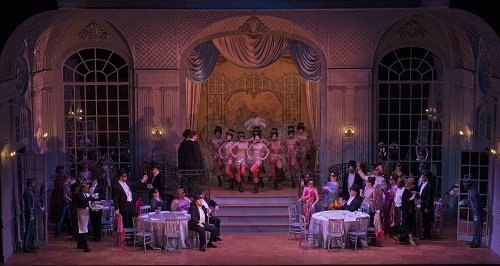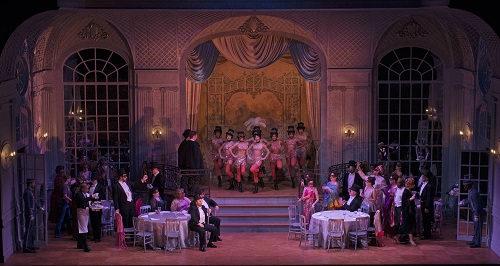 United States Strauss, Die Fledermaus: Soloists, Cincinnati Opera at the Aronoff Center for the Arts, Cincinnati, OH. 16.6.2016 (RDA)
United States Strauss, Die Fledermaus: Soloists, Cincinnati Opera at the Aronoff Center for the Arts, Cincinnati, OH. 16.6.2016 (RDA)

Johann Strauss: Die Fledermaus (1874)
Soloists: Nicole Cabell, soprano; Nicole Hasslet, soprano; Kelley O’Connor, mezzo-soprano; Alek Shrader, tenor; Zach Borichevsky, tenor; Hadleigh Adams, baritone.
Technical: Robin Guarino, stage director; David Charles Abell, conductor; Allen Mayer, scenery; Candice Donnelly, costumes; Thomas Hasse, lighting; Sarah Hairston, choreographer; Henri Venanzi, chorus master.
A joke played on a friend leads to a chain of misunderstandings, some marital indiscretions, and a night in jail. In short, that is the flimsy excuse of a plot that serves to prop up the sublime Viennese confection, Die Fledermaus —here still not titled “The Bat”, perhaps to avoid any unwanted association with baseball or vampires.
Of over a dozen operettas penned by Johann Strauss, Die Fledermaus is arguably his best and certainly the most popular on this side of the ocean. With one show-stopping set piece after another and superb vehicles for six singing actors, the score is a gem. All that’s needed are a first-tier, full-lyric soprano, one pert soubrette, a couple of good tenors, a personable baritone, and a colorful mezzo—all decked out in vintage white tie and tails.
David Charles Abell conducted with plenty of Viennese schlag and an absolute command of the style. Henri Venanzi’s chorus did splendid work, looking great in Candice Donnelly’s period-perfect costumes.
Nicole Cabell made a glorious Rosalinda, drop-dead elegant in 1930’s attire, with terrific comedic timing, plus a lush and flexible voice that can take on the vocal minefield of the Act II Czardas with Hungarian flying colors. The low-lying role of Eisenstein is a hybrid, often sung by high baritones. Tenor Zach Borichevsky sang it beautifully, playing the philandering husband with plenty of panache.
As Alfred, tenor Alek Shrader sang all the notes Strauss wrote plus some that high lyric tenors wish the composer had written, delivering a performance high in vocal energy and comic antics. Hadleigh Adams was an elegant Falke, spinning the solo line with feeling, and leading the ensemble in the “brotherhood” ensemble in the party scene.
Soprano Nicole Hasslet was a bright-voiced Adele with lots of personality, and never better than in the famous “laughing song” and the “audition” aria. Kelley O’Connor was an amusing Prince Orlovsky, convincing in her brief travesti role and singing the Act II couplets in a rich high mezzo.
Director Robin Guarino supervised the action in an elegant hotel designed by Allen Mayer, and bathed in sexy low lights and splashes of color by Thomas Hasse. It’s a classy, edgy production where all sort of naughty things go on in the set’s nooks and crannies, while everyone drinks champagne and dances as fast as they can, never looking beyond their drunken revelry as 1938 nears—when the world would change forever.
Rafael de Acha
